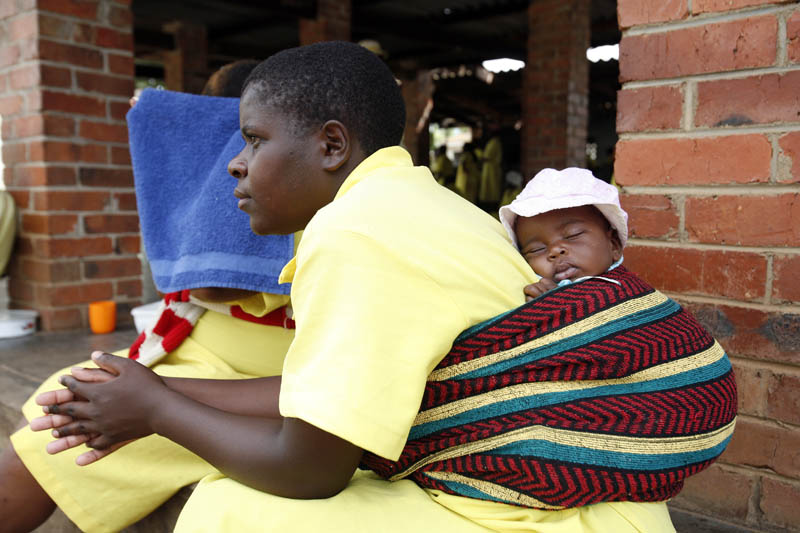
JAILED women and their minor children continue to suffer the brunt of inadequate funding at Zimbabwe’s prisons, with a recent report on the living conditions in prisons revealing that female prisoners were also prone to sexual abuse by their guards.
VENERANDA LANGA
The report, produced by the Zimbabwe Lawyers for Human Rights (ZLHR), the Law Society of Zimbabwe and the Community Law Centre at the University of Western Cape entitled Pre-Trial Detention in Zimbabwe: Analysis of the Criminal Justice System and Conditions of Pre-Trial Detention, says poor budgetary allocations to prisons have severely affected rehabilitation of offenders, among other things.
“The plight of women detainees is a major concern, considering the lack of capacity in the prisons to adequately provide for them in terms of infrastructure and particularly their reproductive health needs,” the report reads.
“The susceptibility of women offenders to sexual abuse even at the hands of law enforcement officers underscores the need to give special attention to the current conditions for women in detention centres,” it says.
The report says the issue of children incarcerated with their mothers is of grave concern in that they end up serving sentences yet the prison conditions are not at all conducive for early childhood development.
“While there is clearly a dilemma about how to encourage communities to provide a safety net for children whose mothers are incarcerated, one wonders why the government and its partners cannot make adequate provision for these children whose mothers are incarcerated. One wonders why the government and its partners cannot make adequate provision for these children in order to enable their early childhood development,” the report says.
It recommends provision of kindergarten facilities in the prisons as one way of helping to ensure that the children do not lose out entirely while in custody with their serving mothers.
- Chamisa under fire over US$120K donation
- Mavhunga puts DeMbare into Chibuku quarterfinals
- Pension funds bet on Cabora Bassa oilfields
- Councils defy govt fire tender directive
Keep Reading
Chairperson of the Parliamentary Portfolio Committee on Justice and Legal Affairs Jessie Majome, who was guest of honour at the launch of the report last Friday, said the committee had discovered that government had no budgetary reserves for children incarcerated with their mothers because there was no legal instrument to legalise the allocation.
“One wonders why government cannot make adequate provision for the children in custody so that early childhood development is given. Why is it that we have a policy of detaining children with their mothers when there is no provision for food?” Majome queried.
“The ministry said there was no statutory instrument authorising them to provide for the children, but my committee reminded the ministry that it was in their powers and responsibilities to craft the relevant statutory instrument to cater for those children,” she said.
She said the prison system was unfair in that trials took long to take place while prisoners were in remand prison, with foreign nationals in prisons being the worst affected.
“There is need for government funding to upgrade the structures in prisons and to also upgrade information communication technology systems there for recordkeeping because there are many cases where prisoners’ files are said to be missing. My committee will conduct an inquiry into the prisons and detention centres and make a public report because prisoners are the most vulnerable in times of scarcity and social strife,” Majome said.
The report also cites lack of uniforms, abuse of inmates and overcrowding at the country’s prisons.
“Prison facilities have in the past been notorious for their failure to provide uniforms for inmates, with reports of prisoners receiving torn and tattered uniforms that compromised their dignity. There have even been reports of prisoners sharing and taking turns to wear uniforms as a result of the severe shortage. A priority of good uniforms was given to suspects in remand prison who would be attending court,” it says.
On abuse of prisoners, the report says they experience a variety of abuses, among them being made to work on private farms of senior officials outside their official labour hours.
“The time allocated for visits to see prisoners was another area of concern as it is not clear in the Prisons Act and the time allowed often does not take into consideration visitors from far away. It was reported that when donations were made by organisations intended to benefit inmates, prison officers would often take some of the goods home.”
Speaking at the launch, Research and Advocacy Unit researcher Caroline Kache said overcrowding in prisons was mainly being driven by immigrants some of whom spent even three years in custody before repatriation or trial.
“I was also shocked when I saw a 10-year-old boy who was incarcerated with his foreign mother and the boy was put in the male section of the prison,” Kache said.
Godfrey Malembeka of the Prisons Care and Counselling Association of Zambia said the Zimbabwean prison situation was almost the same as in Zambia where cells were built during the colonial era and never upgraded.
“One finds 120 people in a cell meant for 15 people and they end up sleeping zigzag while some have to stand. There is also a problem with court registers where some files get lost and only four out of 10 provinces have judges. The police who are given a budget for prisoners’ transport instead use those vehicles to transport their bricks and to do other businesses instead of transporting prisoners to court,” Malembeka said.
Timothy Mtambo of the Centre for Human Rights and Rehabilitation in Malawi said the country faced serious challenges in legal representation where the ratio was one lawyer to 38 500 people.
Zimbabwe’s prison population stood at 18 460 inmates before the Presidential amnesty last month which saw 2 000 convicts pardoned.











